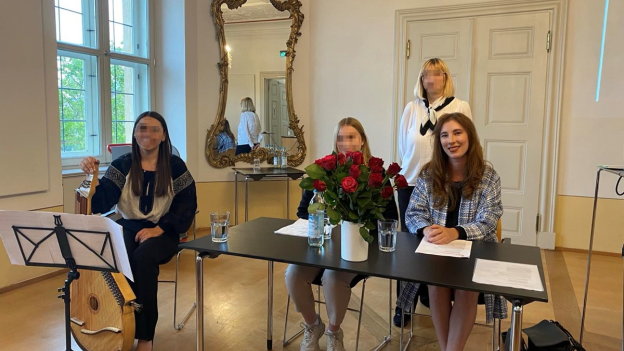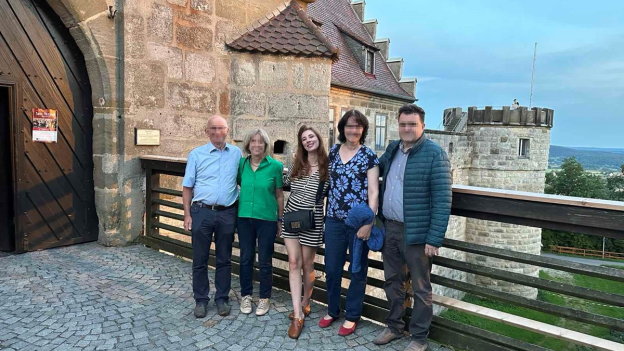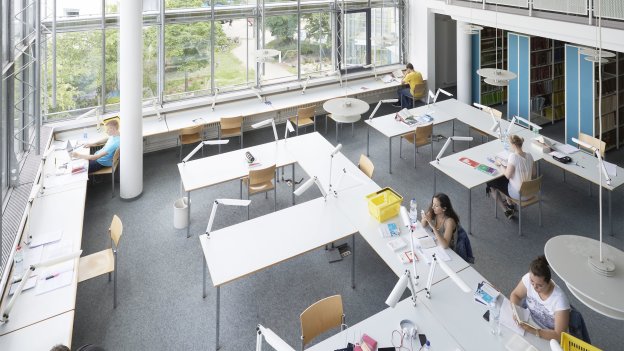Natalya Paslavska
 Privat
Privat
Natalya Paslavska at Marienplatz
“There are times in life when you think there is no justice in this world and never will be – then friends come along and show you that things are not so dire after all.”
Dr. Natalya Paslavska is a legal scholar in Ukraine. With the Möller Scholarship from the DAAD-Stiftung, she was able to spend three months in Germany and withdraw the war in Ukraine for a short time.
In the following report she describes her experiences:
Given the extreme situation that people are currently experiencing in Ukraine, the state is having to implement effective reforms in all areas of government so as to ensure that after the war things return to normal as quickly as possible and Ukraine’s path to EU membership is accelerated.
Under these circumstances, there are very compelling reasons for Ukraine to be familiar with the historical legal experience of developed European states and indeed to adopt certain elements so as to align the Ukrainian legal system as closely as possible with the national legal systems of the EU states. This is also why my research project is dedicated to the topic “The history and function of administrative jurisdiction in Germany as a potential model for Ukraine”.
I started by analysing the history of German administrative jurisdiction, which most legal historians agree does not begin with the Baden Act of 5 October 1863 “concerning the organisation of internal administration”, but in fact goes back to the early modern era and was historically linked to processes of “territorialisation, bureaucratisation and the growth of the administrative apparatus”.

Privat
In a musical setting
As far as administrative jurisdiction is concerned and its beginnings in Germany, there is a broad and a narrow view among German scholars. Martin Sellmann is opposed to his colleagues’ narrow definition of administrative jurisdiction and their proposition that modern administrative jurisdiction in Germany dates back to the establishment of a specific court which decides on administrative and legal issues.
Sellmann believes that the proceedings of the Imperial Chamber Court and the Imperial Court of Justice in disputes between sovereigns and their subjects were the precursors of modern administrative jurisdiction in Germany, although supreme jurisdiction was not sufficiently investigated at that time and the Holy Roman Empire of the German Nation did not receive any special attention in national historical research.
Looking at the cases dealt with by these courts, Sellmann concludes that the latter not only ruled in cases of administrative disputes but also controlled administrative activity in the territories of the Holy Roman Empire. Other studies are devoted to institutional developments at imperial level, which began in 1495 and were seen as a consequence of the disputes between the Emperor and the Imperial Estates over the creation of the imperial constitution.
This research demonstrated that it was institutions such as the Imperial Chamber Court and the Imperial Court of Justice that consolidated the values and norms of early modern society, thereby having a significant impact on conflict resolution and stability in the Holy Roman Empire. In this connection, it is interesting to note the efforts of researchers addressing the subject of protests and conflicts and their identification of a specifically German tradition of resistance and right of resistance, which ultimately found expression in the German Peasants’ War and the subsequent peasant and civil uprisings. It would be possible to verify this thesis – or more likely reject it – based on a comparison with the Ukrainian peasant wars of 1648-1652.

Privat
At the Franz Marc Museum in Munich
One key point of the research was to analyse aspects of legal history concerning control over public administration in Germany from 1806 onwards: this revealed how the debate played out between German conservatives and liberals on the question “Which is the more effective way to control public administration – by internal administrative forms of control or by court protection, and if so, by which court?”. For the liberals, the control of administrative activity by the independent judiciary was “the most important of all constitutional rights”: mainly recruited from bourgeois circles, the judiciary had to gain legal control over the monarchical executive in order to guarantee civil freedom and equality.
In the battle in which they were forced to engage between tradition and modernity, however, conservative forces were not prepared to make concessions. Yet in spite of all the differences in their notions of order, the liberal and conservative political camps were largely in agreement that the legally organised control of public administration was one of the most important issues, since the arbitrary wielding of administrative power was seen to threaten not just the state at that time but private and public freedoms as well. Controversial proposals by both camps are discussed in detail in the article. In contrast to the French principle of the separation of powers, which asserted that “to judge administration is also to administer”, Germany tended to favour administrative justice (subject to numerous restrictions).
Yet many parallels can be traced between the arguments for and against, as put forward by German and French legal historians. Quite apart from specific historical and legal processes, different countries sometimes face similar political challenges: though the discussions are independent of each other, the arguments used are virtually identical. Such national debates in response to shared challenges often give rise to very similar solutions to problems. Incidentally, this principle of the separation of powers was developed independently in Ukrainian legal thinking. Here I refer to the constitution of Pylyp Orlyk (1710), which also advocated the separation of powers.
Analysis of the historical background to German administrative jurisdiction ultimately leads to the following conclusion: it was the prototypes of the administrative courts in Germany that laid the foundations for administrative jurisdiction in the second half of the 19th century.

Privat
Castle tours in and around Munich
Administrative jurisdiction as such was not established in Germany until the absolute monarchy was abandoned and there was a “shift towards a form of state and government based on the principle of the separation of powers” (E. Hien). This was reflected in the endeavours of the liberal middle classes to allow the state only authorised interference in their liberties, something that could only happen if a body was independent of the executive and had the power to determine and rectify violations of the law. This was achieved with Article 182 of the Paulskirche Constitution of 1849: “Administrative jurisdiction ceases; the courts decide on all violations of law.”
Here it is important to note that the first administrative court was not established in 1863 in the Grand Duchy of Baden, which was not part of the German Empire at the time. This fragmented development of German administrative jurisdiction over time could provide an example for Ukraine of how administrative jurisdiction might be re-established in occupied Ukrainian territories in the foreseeable future. In this connection it is particularly interesting to look at how administrative jurisdiction was re-established in the occupation zones in Germany after 1945.
I analysed developments in the American, British and French occupation zones from the point of view of how and to what extent the experience gained here could be relevant to Ukraine in the future. Administrative jurisdiction in independent Ukraine is still in its infancy: nobody doubts that is an urgent necessity. In order to drive it forward swiftly on a step-by-step basis, it is worth drawing on the experience of developed European democracies, especially in Germany, which not only has a long experience of administrative jurisdiction, but was also able to re-establish administrative jurisdiction within a short time after being under totalitarian rule and after experiencing its defeat in the Second World War.

FAU D. Hartfiel
View into the Juridicum Library of the FAU Erlangen-Nürnberg
Ukraine is also in a state of war against the Russian aggressor – a process that is extremely difficult and destructive for the country. Victory will soon be achieved, however, and the issue of advancing administrative jurisdiction will then gain in urgency once more. Equally revealing is the analysis of “administrative jurisdiction” in National Socialist Germany and in the GDR . There are numerous parallels to be drawn between these examples and the “administrative jurisdiction” imposed by Russia in the Russian-occupied Ukrainian territories. The German experience could be helpful in restoring the rule of law in liberated territories.
Of particular interest here is the current structure of administrative jurisdiction in the Federal Republic of Germany. As mentioned above, it was quite fragmented at the beginning, initially emerging in different federal states and then in different occupation zones. Independently of this, such fragmentation was eliminated by the Administrative Court Code of 1960. The Basic Law contains two fundamental provisions relevant to administrative jurisdiction in the Federal Republic of Germany.
Firstly, Article 19(4) of the Basic Law states that anyone whose rights are violated by public authority may seek legal protection in court. Secondly, Article 1(3) of the Basic Law states that fundamental rights are directly binding on the legislative, executive and judicial branches of government. This is reflected in a quote by F. Werner: “Administrative law is substantiated constitutional law”.
The development of German administrative jurisdiction from a single-tier to a three-tier system is evidence of the growing importance of administrative jurisdiction in Germany. As is well known, Ukraine also has a three-tier model, but it is structured according to different principles. The current criticism of the need for three levels in German administrative jurisdiction could also be of relevance to Ukrainian experts. Despite being at war, Ukraine is already attempting to establish the conditions required for future EU membership. This applies in particular to the Ukrainian legal system, including Ukrainian administrative jurisdiction.
Taking Germany as an example, an analysis is required of the relationship between the Federal Administrative Court on the one hand and the Federal Constitutional Court and the ECJ on the other, particularly in matters of economic administrative law, planning law, environmental law, etc. Another important point from the Ukrainian perspective is the question of the delimitation of administrative and financial authority, e.g. the issue of dispute resolution between constitutional state bodies, which in Ukraine is still dealt with by the administrative courts. The fact that there are special jurisdictions within administrative jurisdiction in Germany also deserves special attention.
These include the social and financial courts, for example. It would be logical for Ukraine to draw on this experience in connection with its judicial reform in order to reduce the burden on the administrative courts. Another reason might be to replace administrative judges and appoint new professional judges. These and other propositions only go to confirm that Germany’s positive experience is extremely important for Ukraine.
The DAAD-Stiftung scholarship allowed me to remain in a safe place while the war was raging at its worst. I have since decided to return to Ukraine and continue my work at the University of Lviv, which will enable me to pass on the new knowledge I acquired in Germany to my students and peers. I made new contacts with expert colleagues at German universities: this will be helpful for me in that I can now engage in debate with them on controversial research issues.
The University of Nuremberg is the third largest university in Bavaria and has a strong law faculty. I was lucky enough to be able carry out my research under the supervision of Prof. Dr. Bernd Mertens. He lost no time in doing everything he could to integrate me in his team, enabling me to take up a position and not feel isolated. I was given the independence to organise my own working hours at the office and at home (in Bamberg).
My colleagues were extremely friendly and supportive, showing me right away where I could get lunch and a good cup of coffee and what sights I shouldn’t miss. As I became familiar with day-to-day life here, I realised that there are a lot of problems in Germany, too, including such things as low wages, a lack of teachers, etc. But I also saw how swiftly such problems are addressed and solved. I am concerned to see how the views of the AfD are gaining ground, as I feel this could potentially be a step backwards in German history.
Through numerous contacts with German friends – some of whom I knew before and some of whom I met for the first time – I became familiar with German culture, cinema, theatre, food, etc. I was also able to rid myself of certain prejudices – that Germans have no sense of humour, for instance, or that they are too direct. Germans are just as diverse as Ukrainians. My neighbours were always very supportive. My “old” friends in Bamberg – Prof. Dr. Gabrielle Knappe and Dr. Andreas Weihe – went to great lengths to help me. They invited myself and other Ukrainian friends to numerous cultural events – in Nuremberg, Bamberg, etc. We even went on a trip to Italy. When I visited them at home, I found out how the very best German cakes and gateaus are made.
I gained my most vivid impression when I visited the Nuremberg Trials memorial. This experience gave me great hope that every crime against humanity will be punished sooner or later and that there is justice in the world after all. It is important to be able to speak German in Germany. All languages are accepted here, but you soon realise that the Germans definitely like it when you speak good German. Here I would like to thank my mother for teaching me German, which was important in my research work, too.
I visited numerous different churches in Germany, and I was also pleasantly surprised to see different denominations actively working together, combining a church service with a reading or a concert.
I often found myself in comical situations, because sometimes you don’t instantly understand what you’re being asked, and you often order the wrong thing in a restaurant. At first this makes you feel uncomfortable, but eventually you’re able to laugh at the situation. My greatest wish is that the war ends with a victory for Ukraine and that I can invite my colleagues, my friends and those who supported me in Germany to a joint conference or simply to stay in Lviv.
As of January 2024. The German version is the original.


